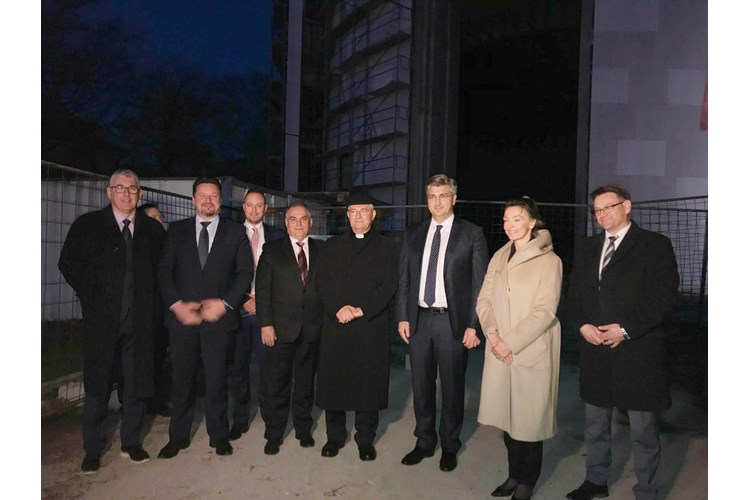


Prime Minister Andrej Plenkovic said on Friday there had been no pressure on Croatia for choosing a Chinese consortium for the construction of the Peljesac bridge and that the bridge would contribute to a more even regional development of the country.
Asked by reporters in Solin if there had been any pressure, given that it would be the first time that a Chinese company was building in a European Union country, Plenkovic said, "No, absolutely not."
He said the construction tender had been carried out transparently in two rounds and in line with both European Union and Croatian public procurement regulations.
He said the Hrvatske Ceste (HC) road operator "chose the best bidder. We believe this project will be realised, that we will finally get a real, firm road connection between south Dalmatia and the rest of Croatia."
Plenkovic said the bridge was a strategic project and the most visible one in this financial perspective, recalling that the EU was co-financing it with EUR 357 million, 85% of the cost, which he said was "a big injection... and a contribution to a more even regional development of the country."
Prime Minister Andrej Plenkovic said on Friday that Croatia and Slovenia were closer to an agreement on their border than appeared in public, that Croatia had presented its model for the agreement to Slovenia and that it could be a very good basis for a final solution.
"Once again I repeat - I think we are much closer to a solution than appears in public. We have explained our stances to the Slovenian side as well as to all our partners in the European Union," Plenkovic said in the southern town of Solin on Friday.
"We are acting responsibly and maturely in this situation and are not undertaking any unilateral steps that could in any way contribute to worsening relations between Croatia and Slovenia," he added.
Earlier in the day, Slovenia's Foreign Minister Karl Erjavec said in parliament that sooner or later, Croatia would have to change its attitude to the arbitration ruling on the Croatian-Slovenian border dispute and that his ministry was preparing a lawsuit to be filed against Croatia before the Court of Justice of the EU.
"At this moment, I don't see any grounds for any lawsuit before the European court because Croatia is not violating any element of EU law. If Slovenia heads down that path, we will know how to respond," Plenkovic said in a comment on Erjavec's statement, underscoring that Croatia had "presented its model to the Slovenian side and it could be a very good foundation for a final solution." He did not elaborate on Croatia's proposal.
"Even if there had not been any problems concerning the arbitration such as its having been compromised and violation of international law and provisions of the arbitration agreement - which led to the resignation of Slovenia's judge and agent - even then, implementation of the ruling could only be possible with the consent of both countries," he underscored.
"Let's leave what each side is doing unilaterally aside. What is important is that an agreement on the border can only be achieved through clearly expressed political will and consent by the two countries. That's where the story starts and ends," he concluded.
Commenting on the Slovenian government's decision of Thursday to adopt several implementing laws aligned with the arbitration ruling, which "return" the hamlets of Mlini, Skodelin, Buzini and Skrilje on the left bank of the Dragonja River under Croatian governance after they were joined with the Slovenian municipality of Piran in 1994 at the request of the then parliament and with the consent of the then government, led by Janez Drnovsek, Plenkovic said that those hamlets had been Croatian anyway.
"Do you think that we need a Slovenian law to tell us that those villages are on Croatian territory? I don't need it. I know where the Croatian border is," he said.
Prime Minister Andrej Plenkovic said on Friday a recent statement by family minister Nada Murganic which elicited criticism had not been the most fortunate but that his HDZ party's position on not tolerating domestic violence was clear.
Asked by reporters in Solin about the opposition's demands that Murganic be sacked, Plenkovic said "that statement wasn't the most fortunate, quite the contrary," but that his position and the position of all cabinet ministers was very clear and very firm concerning the prevention and intolerance of domestic violence.
Plenkovic recalled that the HDZ had ousted Tomasevic from its ranks yesterday because of the accusations against him and that this showed that the party did not tolerate domestic violence.
Text: Hina